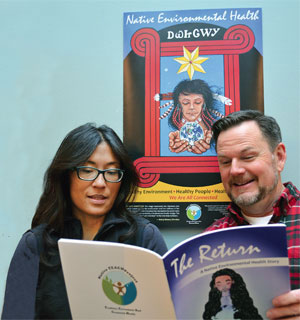Storytelling has long been a powerful way to pass on knowledge in Native American communities. Now, a center within the School is honoring that tradition as a way to spark discussions about environmental issues and public health within Tribal communities. The Center for Ecogenetics & Environmental Health, in the Department of Environmental and Occupational Health Sciences, has produced a 32-page comic book called The Return, A Native Environmental Health Story. It's about a Native woman and her child, their relationship to the environment, and how they are able to heal what's been damaged.

Researchers Michelle Montgomery and Jon Sharpe
read "The Return" Photo: Jeff Hodson
"The moral of the story is we're all connected to the environment. Without a healthy environment, we're going to have human health issues," says Michelle Montgomery, a post-doctoral researcher who helped develop the comic book version of the story. The narrative is based on surveys, interviews and "talking circles" that were held in Native communities in partnership with the Northwest Indian College.
A member of the Haliwa Saponi/Eastern Band Cherokee tribe from North Carolina, Montgomery says oral tales are an important part of indigenous culture. "Certain stories are shared during certain seasons, and some are told to change behavior and health," she says. "Everything has a story. That's the way I was brought up."
Native languages, however, typically lack equivalent terms for "environmental health" and "public health." An illustrated story was seen as the most effective way to engage Tribal communities, from teens to elders, in conversations about environmental health and the healing power of their own traditional knowledge.
"Our goal is to use The Return as a starting point to talk about what environmental health means in their communities and what issues they want our researchers to help them address," says Jon Sharpe, the center's administrator. The book also contains a discussion guide and suggestions for related art projects.
So far, copies have been distributed to places including the Northwest Indian College, The Institute of American Indian Arts, a Native symposium at UW Tacoma, a New Zealand indigenous tribal college, and the American Indian Higher Education Consortium annual student conference in Green Bay, WI.
The center received a supplemental grant from the National Institute of Environmental Health Sciences to follow up on The Return. Staff are collaborating with the University of Arizona to hold a series of "community conversations" in Tribal communities in the Pacific Northwest and Southwest. These conversations will be followed by storytelling workshops, which will result in new stories about Native environmental health. These stories could take a variety of forms—artwork, comic books, stories told through social media, and maybe even public murals.
"This year is about creating spaces for these stories to come out in whatever form the workshop participants deem appropriate for their communities," Sharpe says.
